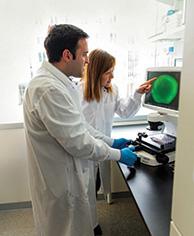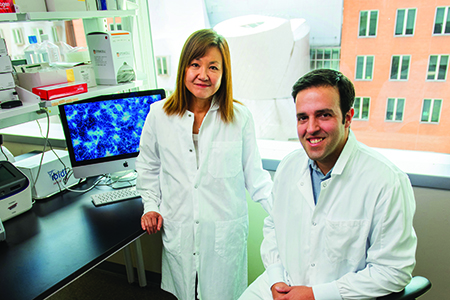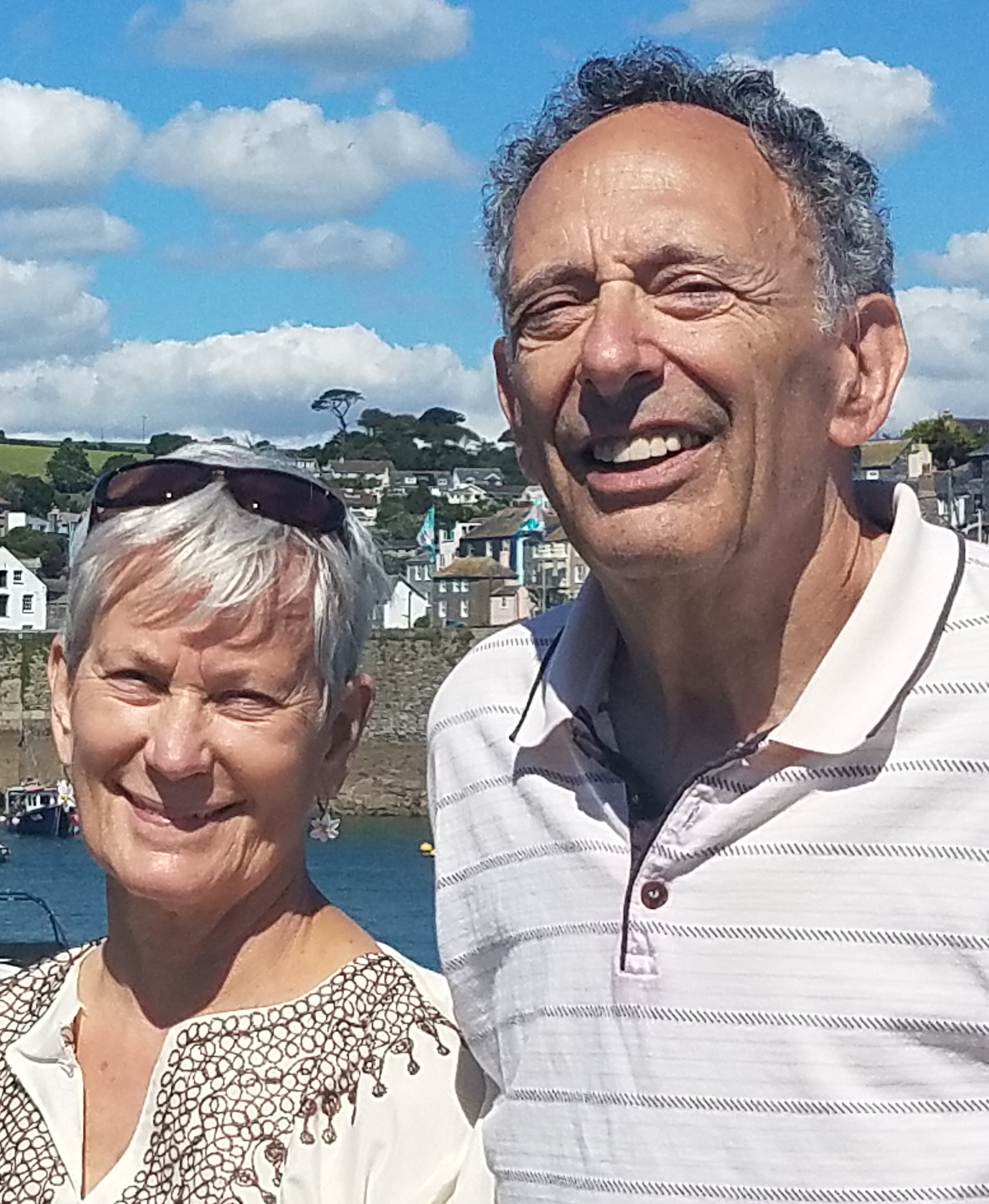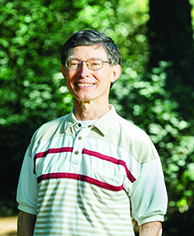“An Exciting Time to Be Doing Neuroscience”
Donors fueling current and future MIT research

Matheus Victor, a postdoctoral researcher in the lab of Professor Li-Huei Tsai at The Picower Institute for Learning and Memory, is one of many researchers at MIT investigating innovative treatments for Alzheimer’s disease. Philanthropic support is essential to this research. Donors like Don ’67, SM ’69 and Glenda Mattes and David Emmes SM ’76 (see stories below) have supplemented their outright philanthropy with bequests made through the MIT Office of Gift Planning that will support the work of The Picower Institute as new opportunities for impact arise.
In Alois Alzheimer’s 1906 paper that defined what we now know as Alzheimer’s disease, he described the buildup of proteinaceous plaques in the brain as a potential cause of the illness. Dr. Alzheimer made another startling finding—the affected brain was laden with lipids. However, research around lipids, which are fats like cholesterol, quickly dwindled and all but vanished from Alzheimer’s research by the 1930s.
“Lipid accumulation wasn’t always present in the brains of patients,” explains Matheus Victor, a postdoctoral researcher at The Picower Institute and recipient of the HHMI Hanna Gray Fellowship. “It wasn’t until genome sequencing came into vogue, roughly 20 years ago, that researchers identified that many genetic mutations that increase the risk of developing Alzheimer’s disease are in genes related to lipids.”
Victor works in the lab of Picower Institute Director Li-Huei Tsai, which focuses on understanding and intervening in Alzheimer’s disease and other memory disorders. A specialist in cellular reprogramming—turning human stem cells into brain cell lab cultures—Victor was attracted to Tsai’s group because of the range of approaches they employ. “Most labs either explore disease-associated mechanisms with molecular and cellular resolution or at a much larger scale, exploring the dysfunction of brain-wide neuronal networks,” he says. “In the Tsai lab, we tackle the disease at all levels.”
That freedom to pursue creative new research avenues is largely thanks to generous philanthropic support of MIT. “I love asking questions and goingwhere the science takes me,” he says. “It’s amazing that we have the privilege to study science in this way.”
“These research initiatives are multi-decade efforts that I value and wish to support beyond my lifetime.”
–David Emmes
A path to specialized treatments.
Victor is the lead author of a paper published in Cell Stem Cell in August 2022 that highlights research supported by the National Institutes of Health as well as individual donors. Microglia, “first responder” immune cells regulating maintenance and injury repair in the brain, are the stars of the study. Using human cultures grown from stem cells, the study found that microglia that express the APOE4 gene—the biggest genetic risk factor for Alzheimer’s, which more than 50% of patients have—cannot metabolize lipids normally. This leads to a buildup of excess lipids that interferes with nearby neurons’ ability to communicate with each other.

The image on the computer shows cyan-stained
neurons labgenerated from skin cells of patients with
Alzheimer’s disease.
“When microglia are inflamed, there’s less brain activity,” he says. “We are trying to understand how the flux of energy production in the microglia is impaired by APOE4, which carries cholesterol itself, and how it breaks down during the metabolic process. The reason lipid accumulation in the brain was disregarded by pathologists in the 1930s may just reflect the APOE4 status of the patients, which we didn’t know until genome sequencing became possible.”
Identifying this behavior in the presence of the APOE4 gene could lead to more effective, specific treatments. “We’ve learned a lot of lessons from cancer genetics. We now name very specific types of cancer, not just related to the part of the body where it originates but the mutation it carries,” he says. “We’re starting to think of Alzheimer’s disease in the same way. It’s an exciting time to be doing neuroscience.”
“My wish is that no one ever has to go through the horrors of Alzheimer’s disease ever again.”
–Glenda Mattes
Making Alzheimer’s a memory.
Tsai, who is also the Picower Professor of Neuroscience, became the director of The Picower Institute in 2009 and co-founded the Aging Brain Initiative at MIT in 2015, which has made discoveries that have redirected the Alzheimer’s conversation across the field. She emphasizes the importance of both short-term and long-term funding for the work happening at Picower.
“You want to be fast, but you also want to make sure to use the most rigorous, the highest-standard work,” she says. “Bequests and other types of planned gifts build a strong foundation for our discoveries.”
More than six million Americans experience varying degrees of memory loss and debilitating illness from Alzheimer’s. Tsai remembers her own grandmother’s diagnosis and laments the stigma of appearing “diminished” from the disease. “Fortunately, there is a vibrant research effort happening at MIT and elsewhere that is leading to real solutions,” she says.
Victor sees that impact most clearly when donors visit their lab. “Talking with supporters of our work and learning about their experiences feels like taking a pulse of the situation. I appreciate the opportunity to share our work with them,” he says. “It really brings home the point of why we’re doing all this.”
Fueling Current and Future Neuroscience Research
Don ’67, SM ’69 and Glenda Mattes

Don Mattes was initially inspired to support The Picower Institute through outright gifts and by incorporating them into his estate plan after his mother was diagnosed with Alzheimer’s disease, before he himself was diagnosed. Since his death in 2020, his wife, Glenda, has carried forward Don’s passion for The Picower Institute’s work.
“My wish is that no one ever has to go through the horrors of Alzheimer’s disease ever again,” she says. “Don’s was a life well lived, just too short.” Glenda supports multiple MIT research initiatives in numerous ways, including a gift of real estate made through the MIT Office of Gift Planning that established both endowed and current-use funds.
David Emmes SM ’76

David Emmes studied mathematics as an MIT graduate student but has long been interested in how the brain functions. This interest became more focused as three extended family members succumbed to Alzheimer’s. He was impressed by The Picower Institute’s approach. “One thing I learned while at MIT for two years was that MIT researchers are intense, focused, and dedicated,” he says. “I knew their perseverance would make any investment both productive and worthwhile.”
In addition to his outright giving, Emmes has also made a bequest in his estate plans to support The Picower Institute. “These research initiatives are multi-decade efforts that I value and wish to support beyond my lifetime,” he says.
Top image: Li-HueI Tsai and Matheus Victor admire a three-dimensional human brain-like culture derived from induced pluripotent stem cells.
Take Action
There are many different types of planned gifts, each with its own financial benefits for donors, their families, and heirs in retirement, financial, and estate planning.
When you talk with MIT about your planned gift, you can ensure that your support is directed to the research and initiatives you care about most.
Contact the MIT Office of Gift Planning at giftplanning@mit.edu or 617.253.4082 to start the conversation today.
